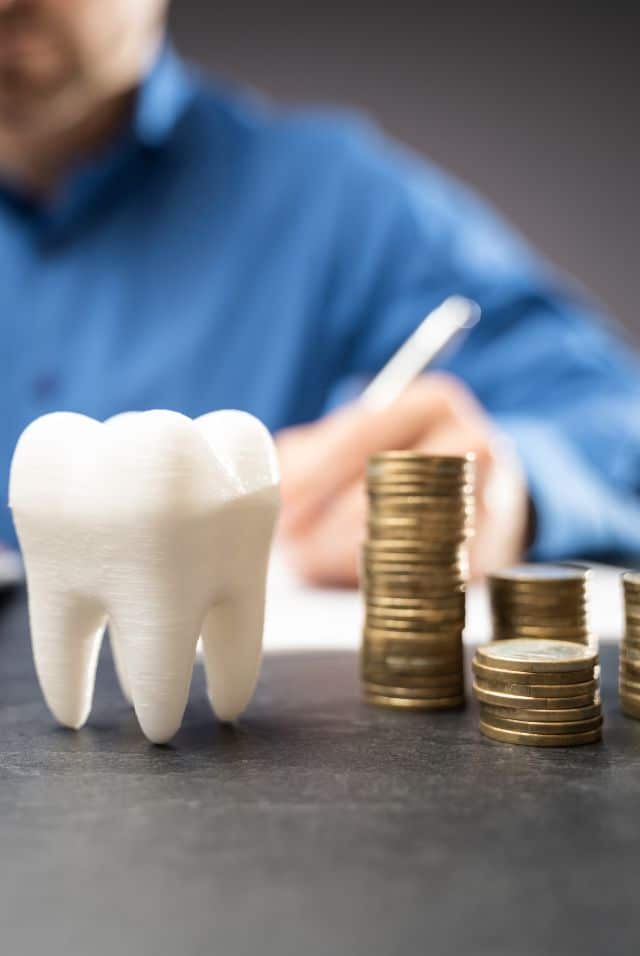How Much Does a Crown Cost Without Insurance? – Overview
Dental crowns are common and used extensively worldwide as part of dental health services. Despite being so common, there are numerous queries about crown implants, their cost, procedure, etc.
Many people want to know how much a dental crown costs without insurance, which is a valid question, considering millions of Americans lack proper health insurance coverage. The latest data from the CareQuest Institute for Oral Health revealed that more than 68.5 million Americans lack dental insurance coverage.
First, you need to remember that there are several factors that determine the final cost of a dental crown implant. On average, dental crowns can cost anywhere between US$ 300 to US$ 3,000, depending on the material used and where you are located.
The total cost can be even more, depending on several dental health factors. Since every individual’s dental needs are unique, it is impossible to suggest an accurate cost of the dental crown implant.
However, we can help you to understand the total cost of dental crown implants by breaking down the factors.
What Factors Determine Dental Crown Cost?
Before deciding to undergo a dental crown implant, it is important to know the average cost of the procedure. This will help you compare different prices and make a more affordable choice.
Some of the major and most common factors that determine the total cost of a dental crown implant are:
- The extent of damage to your teeth
- Type of material used to manufacture the dental crown
- Size of the required dental crown
- Tooth/teeth that need a crown
- Insurance limits, deductibles and insurance carrier policies
- The number of dental crowns needed
- Charges/fees of dentist or dental clinic
The material of the crown will be one of the most prominent factors influencing the overall cost of a dental crown implant treatment. For instance, conventional dental crowns usually cost between US$500 and US$3,000 per tooth.
Porcelain crowns typically cost between US$800 and US$3,000 per tooth, while porcelain fused to metal (PFM) crowns cost between US$500 and US$1,500 per tooth. On the other hand, pure metal dental crowns (usually made of a Gold alloy or a mix) cost around US$800 to US$2,500 per tooth.
Dental insurance coverage for dental crowns can vary widely. Some plans cover 50% to 80% of the cost of the crown, subject to deductibles and annual maximums. So, you will have to pay the remaining balance out-of-pocket.
6 Ways to Get a Dental Crown Implant Without Insurance

Removing and replacing damaged and decayed teeth is vital to maintain good oral hygiene. However, the high cost of dental treatments most often prohibits people without insurance from getting dental crown implants.
In such cases, there are several avenues you can choose to ensure that you get the best dental treatment possible, such as a Dental Charity.
Let’s Explore the Donated Dental Services (DDS) the Dental Lifeline Network provides.
Dental care services are only for eligible applicants, especially children, veterans, and low-income families.
Oral checkups and treatment are provided only to those who qualify for the eligibility criteria set by various non-profit foundations and professional associations.
According to the Delta Dental Services (DDS) program, the dentists and dental clinics treat only the eligible patients who are:
- Age 65 years or older
- Medically fragile or compromised
- Dealing with a lifelong disability
- Unable to pay for dental care treatment (low-income individuals & families)
1. Insurance-friendly Dentist
You should know that your insurance company will only pay for dental crown implants to remedy a functional oral disorder.
If the dental crown procedure is being done to improve the aesthetics, such as your smile, then the insurance company will likely reject the claim and you will end up paying the cost out of pocket.
Still, several dental clinics accept PPO.
2. Government Programs
Medicare does not cover most dental care, procedures, or supplies, such as cleanings, fillings, tooth extractions, dentures, plates, or other dental devices. Medicare Part A (Hospital Insurance) will pay for certain dental services that you get when you’re in a hospital
You will need Medicare coverage to access this facility.
3. FSA (Flexible Spending Account)
FSA is a set amount of pre-tax money that can be taken from your salary and saved to cover only healthcare expenses. Employers usually offer this, which is a common part of employee benefits in most companies. These accounts are usually easy to access with a simple debit card that you can use anytime.
However, it would be best if you remembered that FSA plans can offer a grace period of up to 2.5 extra months to use the funds or allow you to carry over up to $550 per year to use in the following year, depending on the employer’s plan.
4. HSA (Health Savings Account)
An HSA is similar to an FSA but is classified as a government-regulated savings account that also lets you set aside a set amount of pre-tax income to cover healthcare expenses. The major difference between HSA and FSA is that HSA funds can roll over to the next year.
You must be enrolled in a high-deductible health plan (HDHP) to be eligible to contribute to an HSA. Your contributions are also tax-deductible.
5. Dental Schools
Dental schools in your area are bound to offer dental care services, including crowns. A quick Google search can help you find these schools and get low-cost crown implants.
The procedures are low-cost because they are performed by dental students under the direct supervision of an experienced board-certified dentist or dental surgeon.
6. In-House Dental Payment Plans
Many dentists today understand the burden of getting dental care without insurance and offer monthly payment plans.
This way, you don’t have to pay the total amount of the dental crown procedure at once. This is a perfect solution for individuals without proper dental or health insurance.
Besides this, there are several modes of payment you can choose, such as dental credit cards, to make it even easier to get a dental crown procedure.
Conclusion
The technology and material used to create dental crowns, along with the expertise of the dentist performing the procedure, make up the total cost of the treatment. Find the best and most affordable means to get dental crown treatment without insurance.
Dental Grants by State
See Also
How to Get Dental Implants Covered by Insurance?
Dental Grants for Low Income Adults
Free Dental Implants for Seniors
Free Dental Implants for Disabled
